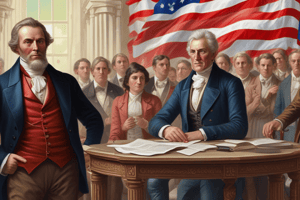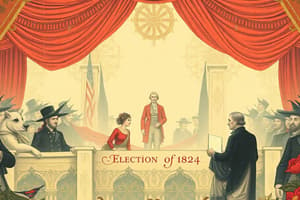Podcast
Questions and Answers
Which candidate represented the Democrats in the Election of 1912?
Which candidate represented the Democrats in the Election of 1912?
- Charles Evans Hughes
- Woodrow Wilson (correct)
- Theodore Roosevelt
- William Howard Taft
What was New Nationalism?
What was New Nationalism?
A platform that campaigned for stronger control of trusts, woman suffrage, and social welfare.
What did the New Freedom platform advocate for?
What did the New Freedom platform advocate for?
It favored small enterprise, entrepreneurship, and unregulated markets.
What is 'the triple wall of privilege'?
What is 'the triple wall of privilege'?
What did the Underwood Tariff Bill do?
What did the Underwood Tariff Bill do?
What did the 16th Amendment accomplish?
What did the 16th Amendment accomplish?
What did the Federal Reserve Act establish?
What did the Federal Reserve Act establish?
What were Federal Reserve Notes?
What were Federal Reserve Notes?
What did the Federal Trade Commission Act of 1914 authorize?
What did the Federal Trade Commission Act of 1914 authorize?
What was the significance of the Clayton Anti-Trust Act?
What was the significance of the Clayton Anti-Trust Act?
What did the Federal Farm Loan Act of 1916 accomplish?
What did the Federal Farm Loan Act of 1916 accomplish?
What did the Warehouse Act of 1916 authorize?
What did the Warehouse Act of 1916 authorize?
What was the purpose of the La Follette Seamen's Act?
What was the purpose of the La Follette Seamen's Act?
What did the Workingmen's Compensation Act of 1916 do?
What did the Workingmen's Compensation Act of 1916 do?
What did the Keating-Owen Act of 1916 prohibit?
What did the Keating-Owen Act of 1916 prohibit?
What did the Adamson Act of 1916 establish?
What did the Adamson Act of 1916 establish?
Who was Louis D. Brandeis?
Who was Louis D. Brandeis?
What were Wilson's views on foreign policy?
What were Wilson's views on foreign policy?
What was the Hay-Pauncefote Treaty?
What was the Hay-Pauncefote Treaty?
What happened to the Panama Canal Tolls Act of 1912?
What happened to the Panama Canal Tolls Act of 1912?
What did the Jones Act of 1916 grant to the Philippines?
What did the Jones Act of 1916 grant to the Philippines?
What occurred in Haiti in 1915?
What occurred in Haiti in 1915?
How did Wilson expand Caribbean holdings?
How did Wilson expand Caribbean holdings?
What was happening in Mexico under Wilson's presidency?
What was happening in Mexico under Wilson's presidency?
What prompted Wilson to get involved in the Mexican Revolution?
What prompted Wilson to get involved in the Mexican Revolution?
Who was Venustiano Carranza?
Who was Venustiano Carranza?
Who was Francisco Villa?
Who was Francisco Villa?
What was General John J. Pershing's campaign against Pancho Villa?
What was General John J. Pershing's campaign against Pancho Villa?
How did World War I start?
How did World War I start?
Who were the Central Powers?
Who were the Central Powers?
Who were the Allied Powers?
Who were the Allied Powers?
What did President Wilson issue after the declaration of WWI?
What did President Wilson issue after the declaration of WWI?
What was the American attitude towards Germany at the beginning of WWI?
What was the American attitude towards Germany at the beginning of WWI?
Who was Kaiser Wilhelm II?
Who was Kaiser Wilhelm II?
What was the impact of WWI on American industries at the beginning of the war?
What was the impact of WWI on American industries at the beginning of the war?
What happened to the Lusitania in 1915?
What happened to the Lusitania in 1915?
What was the American response after the sinking of the Lusitania?
What was the American response after the sinking of the Lusitania?
What was the Arabic?
What was the Arabic?
What was the Sussex?
What was the Sussex?
What did Wilson do after Germany sunk the Sussex?
What did Wilson do after Germany sunk the Sussex?
Who did the Republicans choose in the Election of 1916?
Who did the Republicans choose in the Election of 1916?
Flashcards are hidden until you start studying
Study Notes
Election of 1912
- Woodrow Wilson represented the Democrats with a progressive platform emphasizing antitrust laws, banking reform, and tariff reductions.
- Theodore Roosevelt formed a third party with the New Nationalism platform advocating for stronger trust controls and social welfare programs.
New Freedom
- Wilson's 1912 platform focused on small enterprises, entrepreneurship, and unregulated markets, opposing social-welfare programs and supporting trust fragmentation.
Triple Wall of Privilege
- Wilson aimed to tackle tariffs, banks, and trusts simultaneously as part of his economic reforms.
Underwood Tariff Bill
- Enacted in 1913, it significantly lowered tariff rates and introduced a graduated income tax for incomes exceeding $3000.
16th Amendment
- Ratified in 1913, it granted Congress the power to tax income.
Federal Reserve Act
- Established in 1913, it created a federal banking system allowing government control over the money supply and resulting in the formation of the Federal Reserve Board.
Federal Reserve Notes
- Issued by the Federal Reserve Board, these paper currencies replaced previous federal currencies and facilitated flexible money circulation.
Federal Trade Commission Act of 1914
- Created a commission to oversee industries in interstate commerce, aimed at dismantling monopolies.
Clayton Anti-Trust Act of 1914
- Enhanced the Sherman Act by prohibiting interlocking directorates, protecting labor unions, and holding corporate officers accountable for antitrust violations.
Federal Farm Loan Act of 1916
- Provided low-interest loans to farmers.
Warehouse Act of 1916
- Allowed loans secured by staple crop collateral.
La Follette Seamen's Act of 1915
- Mandated decent treatment and living wages for sailors on American vessels.
Workingmen's Compensation Act of 1916
- Offered assistance to federal civil-service employees during disabilities.
Keating-Owen Act of 1916
- Banned interstate commerce of goods produced by child labor.
Adamson Act of 1916
- Instituted an 8-hour workday for railroad employees engaged in interstate commerce.
Louis D. Brandeis
- Became the first Jewish Supreme Court justice, nominated by Wilson.
Wilson's Foreign Policy Views
- Adopted an anti-imperialist stance, stepping back from aggressive foreign policies.
Hay-Pauncefote Treaty
- Negotiations allowing the U.S. to build the Panama Canal without British interference.
Panama Canal Tolls Act of 1912
- A repealed bill seen as unfair to Britain, exempting the U.S. from trading tolls.
Jones Act of 1916
- Granted the Philippines territorial status, promising eventual independence.
Haiti in 1915
- Wilson intervened due to political instability, sending marines for protection and overseeing finances.
Expansion of Caribbean Holdings
- The U.S. bought the Virgin Islands from Denmark in 1917.
Mexican Revolution Under Wilson
- Instabilities arose following the murder of President Francisco I. Madero, leading many Mexicans to migrate to the U.S.
Wilson's Involvement in Mexico
- Initiated action after American sailors were captured in Veracruz, leading to a military intervention.
Venustiano Carranza
- Took over as President of Mexico after Huerta's regime was toppled.
Francisco Villa
- Attempted to instigate conflict with the U.S. through violent actions against Americans.
General John J. Pershing
- Led a failed military endeavor to apprehend Villa before retreating due to the looming threat of WWI.
Outbreak of WWI
- Triggered by the assassination of Archduke Franz Ferdinand, leading to a barrage of alliances and militarization.
Central Powers
- Comprised Germany, Austria-Hungary, Bulgaria, and the Ottoman Empire.
Allied Powers
- Included Great Britain, France, Italy, Russia, and later the U.S.
U.S. Neutrality at WWI's Start
- Wilson issued a neutrality agreement in 1914, aiming to keep the U.S. uninvolved.
American Sentiment Toward Germany
- Initially, public sentiment was largely anti-German as Kaiser Wilhelm II symbolized autocratic leadership.
Impact of WWI on American Industry
- U.S. industries thrived through trade with Allies, facing protests from Germany but maintaining neutrality laws.
Sinking of Lusitania
- British ship sunk by a German submarine in 1915, resulting in the death of 128 Americans, which led to calls for u.s. intervention.
American Response to Lusitania
- Public demand for war increased, yet Wilson remained hesitant to engage.
Sinking of Arabic and Sussex
- Further sinkings by German forces heightened tensions, prompting Wilson to demand an end to unrestricted submarine warfare.
Election of 1916
- Wilson won re-election running an anti-war campaign against Republican candidate Charles Evans Hughes.
Studying That Suits You
Use AI to generate personalized quizzes and flashcards to suit your learning preferences.




